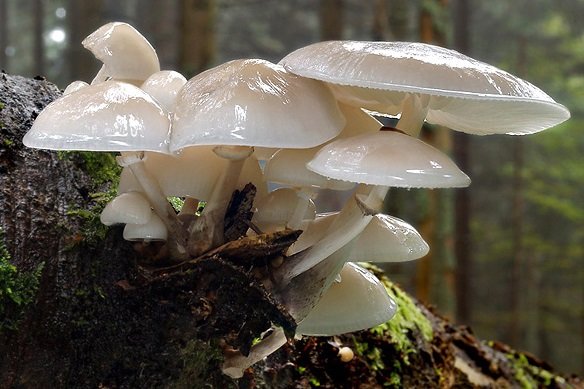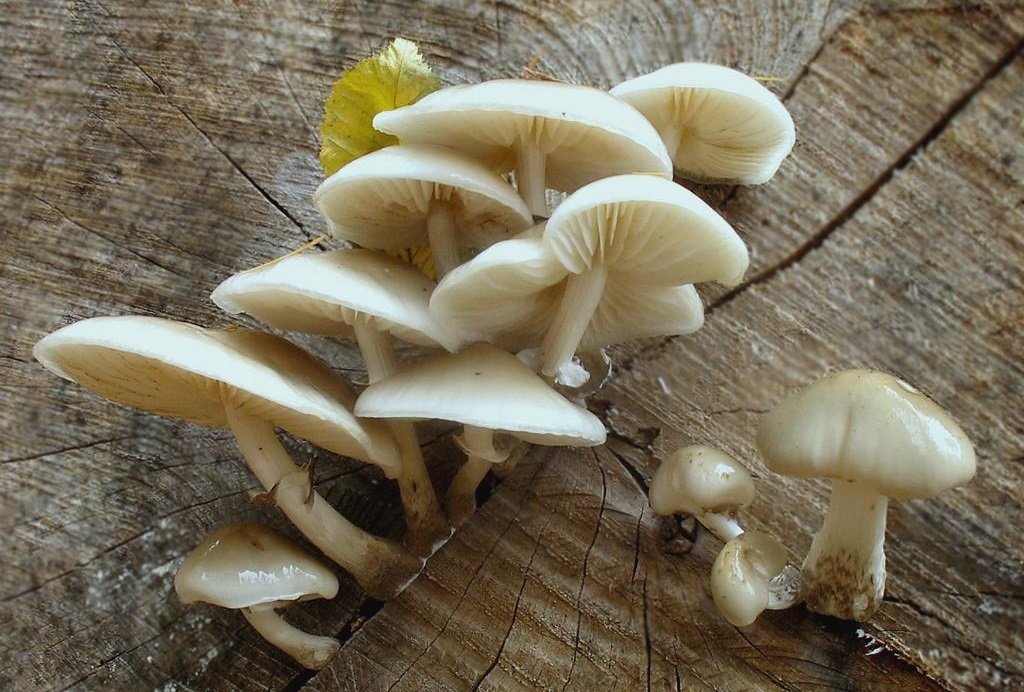Udemansiella mucous (Oudemansiella mucida)
- Division: Basidiomycota (Basidiomycetes)
- Subdivision: Agaricomycotina (Agaricomycetes)
- Class: Agaricomycetes (Agaricomycetes)
- Subclass: Agaricomycetidae (Agaricomycetes)
- Order: Agaricales (Agaric or Lamellar)
- Family: Physalacriaceae (Physalacriae)
- Genus: Mucidula (Mucidula)
- Type: Oudemansiella mucida (Oudemansiella mucous)
- Monetka kleista
- Porcelain Mushroom
- Clammy agaric
- slimy mucidule
- slime armillary
- Ringed Slime Rubling

Udemansiella mucosa grows singly or grows together with legs of two or three fruiting bodies in broad-leaved forests on wood.
head 2-8 (10) cm in diameter, in young mushrooms hemispherical, later prostrate with a transparent sterile edge, mucous, white, light grayish, slightly brownish in the middle. The skin is transparent, covered with a thick layer of mucus
Records sparse, wide (up to 1 cm), adnate with a tooth, white, with intermediate plates.
Споры 16-21×15-19 microns, rounded or broadly ovate, colorless. Spore powder is white.
Leg 4-6 (8) cm in height, 0,4-0,7 cm in thickness, thin, fibrous, brittle, with a white hanging wide ribbed movable (?) ring, mucous under the ring, dry above the ring. The surface in the lower part is covered with small black-brown flakes, the upper part is finely furrowed. The base of the leg is thickened
Pulp white, soft, odorless.
Inhabitation
It grows on thick branches of living trees, on dead and dead trunks of hardwoods, more often on beech, hornbeam, elm, maple, from base to crown (rises to a height of 6 m). Grows on stumps, branches, dead trunks and living trees (especially beech and oak), from July to November, in groups or single specimens. More common in bunches, less often alone.
It is distributed throughout the world, in Our Country it is often and sometimes found in large quantities in the south of Primorye from mid-May to the end of September, and is most interesting to the inhabitants there in the spring, when there are not many other edible mushrooms yet. It is rare in the Moscow and Kaluga regions.

Edibility
Although this mushroom is considered edible, it has no nutritional value.
Edible, but almost tasteless, thinly fleshy, gelatinous mushroom. It is best used in a mixture with other, more aromatic mushrooms.
Notes
In the Far East, her sister Oudemansiella brunneoimariginata is found – also an edible mushroom









